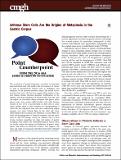Isthmus Stem Cells Are the Origins of Metaplasia in the Gastric Corpus
Author(s)
Hayakawa, Yoku; Wang, Timothy C.; Fox, James G
Download1-s2.0-S2352345X17300425-main.pdf (1.861Mb)
PUBLISHER_CC
Publisher with Creative Commons License
Creative Commons Attribution
Terms of use
Metadata
Show full item recordAbstract
The acquisition of genetic/epigenetic mutations in long-lived gastrointestinal stem cells leads to the development of cancer, as well as precancerous lesions such as metaplasia and dysplasia. In the proximal stomach corpus, this model of progression from stem cells has been supported by studies in mice and human beings, showing abundant proliferation in the isthmus and clonal expansion of mutated cells from the stem cell region. An alternative theory proposes that gastric metaplasia arises from mature differentiated chief cells. Despite reports of low levels of proliferation in chief cells in acute injury models, there is little evidence for reprogramming of chief cells into long-lived stem cells that continuously supply progeny over time. Critical flaws in the chief cell transdifferentiation theory include the definition of acute SPEM, the chief cell-damaging effect of chemical reagents, and the specificity of chief cell lineage tracing. In contrast, there is now strong evidence regarding the stem cell origins of gastric metaplasia that refutes the transdifferentiation theory. Here, we briefly review the history and definition of gastric metaplasia, and outline in detail the evidence that supports the stem cell origin of metaplasia.
Date issued
2017-03Department
Massachusetts Institute of Technology. Division of Comparative MedicineJournal
Cellular and Molecular Gastroenterology and Hepatology
Publisher
Elsevier BV
Citation
Hayakawa, Yoku et al.“Isthmus Stem Cells Are the Origins of Metaplasia in the Gastric Corpus.” Cellular and Molecular Gastroenterology and Hepatology 4, 1 (July 2017): 89–94 © 2017 The Authors
Version: Final published version
ISSN
2352-345X